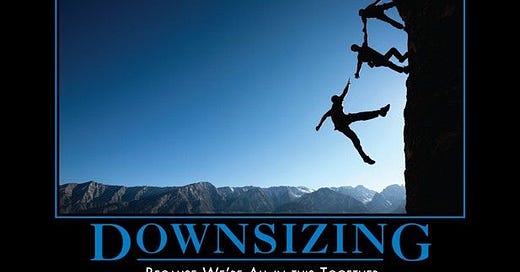During the China virus pandemic, many lost their jobs, but as the fear lifted, I saw “help-wanted” signs everywhere. I even found myself head-hunted a bit, though I’ve been retired for a while. It seemed to me that employers had begun to feel optimistic about the future. But then, layoffs were announced…larger numbers than anyone could have expected. The explanation was “belt-tightening,” but that didn’t make all that much sense.
Some Background
Younger readers might not realize that layoffs used to only occur in plant-closing situations. Until the late ‘80’s, the only time you heard about large-scale layoffs was when a company or a division of a company closed completely. This kind of termination clearly said nothing about the people employed; it wasn’t punitive.
In the late ‘80’s, larger layoffs began to occur almost at random. Though excuses were made, in most cases, it didn’t appear the companies involved were having financial issues. In fact, too often, bosses would keep a poor performer around to have a sacrificial goat, should they be asked to pick someone. It’s also much easier to lay off an employee than to fire them.
But something strange happened once computers got more involved in the business of stock trading. Analysts began to penalize companies for quarter-by-quarter performance, which made business leaders more likely to organize profits to keep looking good. In addition, they also started having more frequent, but smaller layoffs. When no one reports on your actions, it doesn’t cause concern among investors. CEOs react to the market, so they generally try to avoid any behavior that causes analysts to question the viability of their company.
Where Are the Cuts Now?
Apparently, appearances no longer matter. Large cuts are being announced in many major cities.
In the Bay Area (California), cuts are largely in tech and biotech. Does anyone find this concerning? Our two major threats are biological and technological. We’ve just come through a lab-created virus attack and there have been many cyber attacks launched against our government as well as a variety of companies.
Is this actually either sensible or sustainable? I would expect that we need *** more investment in both areas if we want to avoid being at risk of cyberattacks and health care disasters.
The Sad Reality of Downsizing
While the term “rightsizing” is in vogue now, the reality is that many of those in charge of determining who to fire are mostly concerned with their own careers. And yet, aren’t the people in charge the ones responsible for the problems the company faces? Why do they get a pass?
Instead of looking at those responsible, HR will present managers with a list of the oldest and best paid employees; these often become a target, as letting high-paid professionals go looks like it will help the bottom line. And the cost of laying people off has gone down as the packages have shrunk markedly.
Sure, some managers will lose their jobs, but I’ve seen the aftermath of layoffs, where some people find themselves only managing two or three people afterwards. Do we really need the manager now? In fact, since seniority doesn’t count for anything in companies (although it is the primary factor in union jobs), companies end up getting rid of their most experienced and often, most competent employees. New people may cost less, but they don’t have the institutional knowledge, nor do they have the real-world experience of dealing with the people, processes and problems common to a given industry.
It's fascinating to look at the survivors. They come in two groups: hard-working employees who will now be expected to “pick up the slack” left by departing workers, and managers. The managers largely have less work to do, as they manage fewer people. Project managers and other people whose job it is to move work around rather than accomplish it often survive too. Now, you also have to balance against lawsuits, so when I lost my job, I know they had to dump a younger person. (Both of us were top performers, BTW). And don’t get me wrong. I’m not bitter about this, but having been involved in a layoff, I wanted to better understand the rationale behind it.
Another Approach
Companies are fond of hiring “consultants” to tell them what to do, usually the same thing their expert employees have already suggested. How about employment consultants, who will look at employee reviews, interrogate people as to what they are doing (and how much they are doing) and strive to understand the actual value of each person. They will evaluate the problems in the company and discover whose mistakes caused them. This would be the chief focus; get rid of the ones who caused the problems. Then, decisions wouldn’t cause such disruption in getting work done. The day after my layoff, I offered to let my boss know the status of my various projects. One-and-a-half hours later, he was appalled. “You were doing all that?” he said. I actually felt a moment of relief; it was no longer my problem.
Would Facebook/Meta really do better if, perhaps, they laid off Mark Zuckerberg? Twitter did okay without Jack Dorsey. Just a thought – start at the top. Imagine how much money you’d save. And perhaps we could use a few less DIE consultants.




